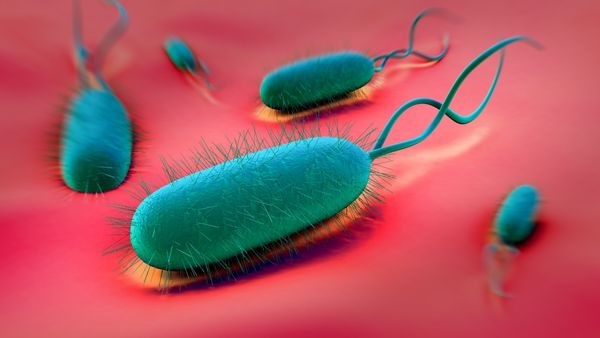
A food poisoning incident in a family dinner in Jixi city of Heilongjiang province, has caused deaths recently. Bongkrekic acid contamination is a leading cause for severe food poisoning and deaths and it is suspected to be responsible for this incident. Its heat resistant trait makes it hard to break down even if the food is cooked under 100℃ or steamed in a pressure cooker.
Helicobacter pylori (H. pylori ) is also a bacteria surrounding us that can survive in the worst environment and make half of the world’s population suffer. According to the Chinese consensus on eradication of Helicobacter pylori and prevention & control of gastric cancer published in the Chinese Journal of Digestion in 2019, H. pylori infection is the leading cause for stomach cancer in China. 15%- 20% of patients have developed peptic ulcer, 5% - 10% of patients have developed H. pylori-related indigestion, 1% have developed malignant tumours in the stomach.
幽門螺旋菌(Helicobacter pylori,Hp),常寄生在胃黏膜組織中,感染後主要引起慢性胃炎和消化性潰瘍等疾病,與胃癌、胃黏膜相關淋巴組織(MALT)淋巴瘤等疾病有密切的關係,被世界衛生組織(WHO)列為第一類生物致癌因數。這種菌對人並不友好,如果我們的胃中存在這種菌,那麼很容易引起胃炎、消化道潰瘍,甚至是淋巴增生等疾病,如果不及時進行調理,很容易導致胃癌的發生,而在中國癌症死亡中,胃癌位居第二。
Around 50% of the world’s population are infected with H. pylori. The prevalence of H. pylori infection varies widely among countries and regions, and among different ethnic groups, depending on socioeconomic level, population density, public health conditions, and water supply. eason . The infection rate of H. pylori will also increase with age. The rate in developing countries is usually higher of about 50%-80% while it is lower in developed countries of about 25%-50%. The rate in China is around 50%.
幽門螺旋菌的入侵,會導致胃部功能下降,很多人之所以有胃潰瘍,慢性胃炎產生影響健康,也和該病菌持續入侵有關,當然,幽門螺旋菌影響健康的過程中,並非無跡可尋,相關的症狀也會出現。如果感覺到身體有異樣,應該儘早察覺並採取合理的調理措施,只有將胃部的幽門螺旋菌殺滅,胃部才能恢復健康狀態
How do we get H. pylori?
- Food & Drink
You may get H. pylori from eating raw food. More and more people like eating sashimi as they want to have the freshest taste, and the original flavour of the food. Other than getting H. pylori, you may also get parasitic worms. The risk of catching H. pylori will increase if you are a frequent sashimi eater. - Public Goods
H. pylori can be transmitted through saliva. If we often eat out, we may come into contact with some public goods that are not being sterilised at high temperature. From that, we are prone to infect H. pylori if we are using utensils that were previously used by people infected with H. pylori. - Bad Personal Hygiene
Some people with bad personal hygiene will not wash their hands after going to the toilet. Their hands are likely to be contaminated with H. pylori as it exists in the mouth and stomach, and in stools.
Those unwashed hands will infect their owner with H. pylori, spread it and put other’s health in great danger.
Important signal of H. pylori!
People can be infected with H. pylori without any significant symptoms and the symptoms vary depending on the infected areas. 30% of the infection will develop into chronic gastritis while 10%-20% will develop into peptic ulcer and very few of the infection will develop into stomach cancer and mucosa-associated lymphoid tissue (MALT) lymphoma.
- Loss of appetite
You will have a bad appetite after being infected with H. pylori. It is because the infection will damage the stomach function and slow down the digestion process. The body will ring the alarm by having a bad appetite if the body cannot obtain enough nutrients from food. Therefore, it is recommended to conduct some tests if you have noticed that you are losing your appetite and are having trouble having a stable meal timing. - Stomach Ache
One of the symptoms of H. pylori infection is having unexplained, painful stomach ache. The stomach is inflamed when the H. pylori has stayed in the stomach for a period of time. The inflamed gastric mucosa is further irritated by the gastric acid and causes persistent stomach ache.因此,經常胃痛的人,最好去檢查判斷是否幽門螺旋菌入侵,有病菌感染現象可以通過合理的調理來控制,防止胃部功能下降明顯。
- Bloating
Frequent unexplained bloating and upper abdomen discomfort can be because of H. pylori infection. Foods accumulate in the stomach as the digestion is not going well after H. pylori infection. This will create a big amount of gas, making it easy to feel bloated.Therefore, it is recommended to stay alert if you have frequent unexplained bloating and upper abdomen discomfort after meals.
- Nausea and Vomiting
When infected with H. pylori, many people experience vomiting. Your body can only be functioning well when the stomach is functioning normally to digest food and provide nutrients. People with H. pylori infection may throw up after eating. This only appears when the digestive function is damaged.When the stomach is damaged, the patient will puke easily under irritation in the stomach. Keep an eye on bacterial infection when there is any unexplained vomiting. Use medication timely and keep a healthy lifestyle to improve the condition.
- Heart Burn
有明顯的反酸燒心等現象,同樣需要警惕幽門螺旋菌入侵,該病菌在人體胃部寄生的過程中,影響了胃功能,胃酸的分泌量多,可能會反酸燒心,甚至導致食管黏膜受影響。經常有這種特殊表現,不確定原因的情况下可以通過檢查來得知,有病菌感染現象及時調理很重要。
日常生活中如何防患幽門螺桿菌呢?
幽門螺旋菌有傳染性,可通過手、不潔食物、不潔餐具、糞便等途徑傳染,所以日常飲食要養成良好的衛生習慣,避免感染和傳染。
- Wash your hands before eating and after going to the toilet: eat cooked food, drink boiled water, wash and peel the fruits and vegetables before eating them raw.
- Maintain Good Oral Hygiene: H. pylori can replicate on tartar that is hard to clean and may cause bad breath. It is recommended to keep good oral hygiene by brushing and rinsing your mouth after each meal, changing your toothbrush and sanitising your cups and utensils regularly.
- Regular Body Check: Living with family members who are infected with H. pylori are at high risk of getting it too. Having a regular body check allows early prevention of the infection and conducts timely treatment.
- 感染者需積極調理:幽門螺桿菌感染常常呈現家族聚集的現象,所以為了有效的根除幽門螺桿菌,防止二次感染,則應積極調理幽門螺桿菌感染的家庭成員,避免感染其他人。
*Photos are extracted from the Internet, please contact us if copyright infringement has occurred. The above information is for reference only. Seek medical assistance immediately if you feel unwell.



